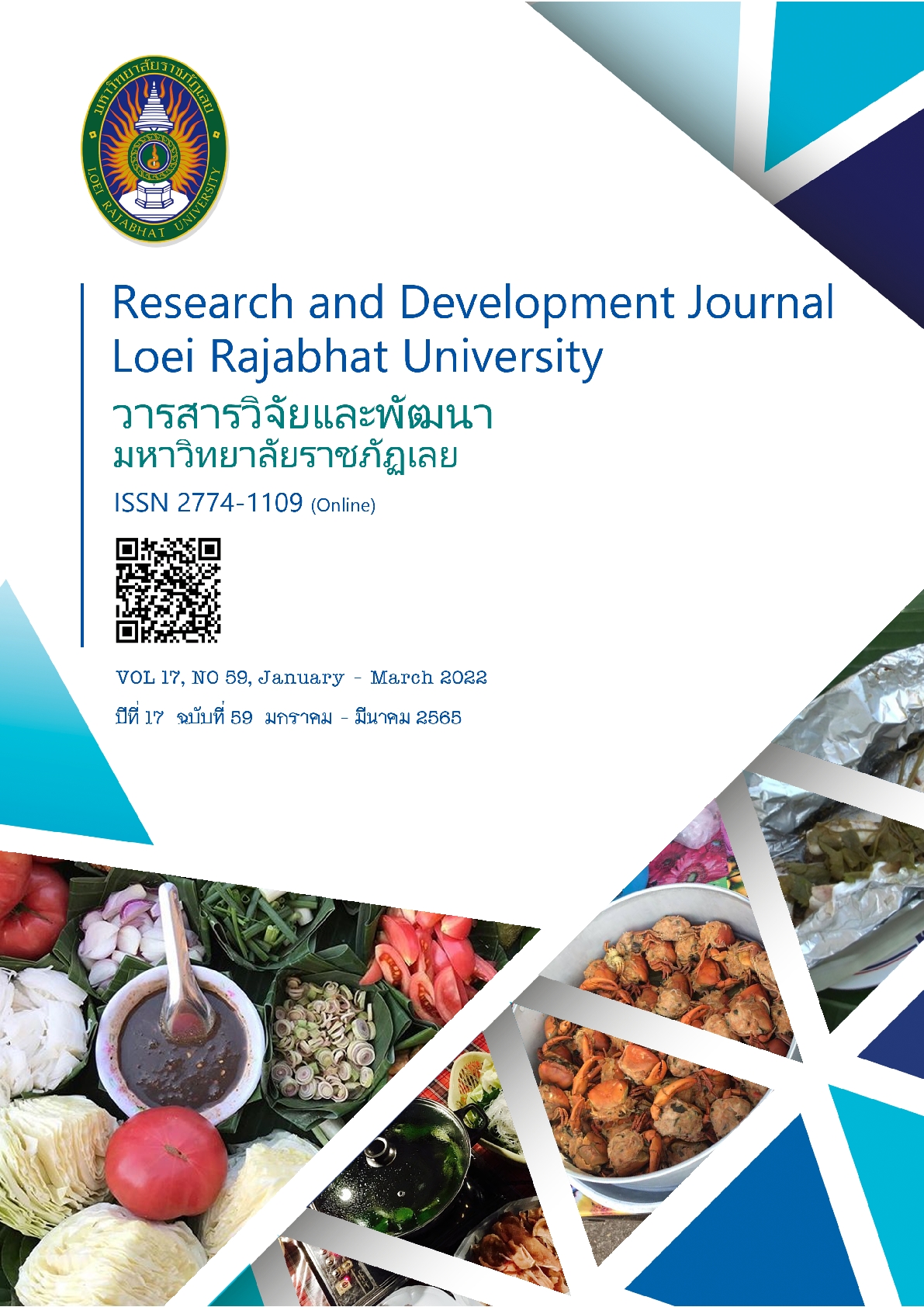Sustainable Community-Based Tourism Resilience After the Covid-19 Pandemic of Ban Hua Aow Community, Sampran, Nakhon Pathom
Keywords:
resilience, sustainable community–based tourism, COVID-19 pandemicAbstract
The research aimed to study community – based tourism components of Ban Hua Aow community, Sampran, Nakhon Pathom and to study sustainable and strengthening community-based tourism resilience throughout the COVID–19 pandemic and beyond of Ban Hua Aow community, Sampran, Nakhon Pathom. This research is qualitative research using phenomenological methods. The data were collected by group interview from 12 key informants by purposive sampling from tourism stakeholders in the Ban Hua Aow community. Its instrument used for data collection include: in-depth interview and do a thematic analysis.
The results indicated as follows; Ban Hua Ao community had community – based tourism components that were: natural tourism resources and cultural aspect that emphasized organic farming, lifestyles that relied on nature; community aspect, local people formed a group of Ban Hua Aow Organic Agriculture Community Enterprise with Ban Hua Aow Organic Agriculture Learning Center was the center of Ban Hua Aow community – based tourism; management aspect, the community was managed by the village committee, there were criteria for joining organic farming community enterprises have been established and the benefits of community-based tourism were managed; also, learning aspect, focusing on creating mutual learning among local people and tourists about organic farming according to the Sufficiency Agriculture Philosophy.
The resilience of sustainable community-based tourism management after the COVID–19 situation of Ban Hua Aow communities found that local people have been cope with the COVID-19 situation effectively and promptly. They have followed and lock down themselves in their area but still carried on his own agriculture. For adaptation, they installed screening points, registration points, temperature measurement points and measured to wear a face mask at all times. Furthermore, they transformed the distribution of organic products by adding more online distribution channels, encouraged local people to take part in becoming a member of the organic farming community enterprise and raised awareness of hygiene and sanitation safety for them in preparation for the arrival of tourists.
References
กระทรวงการท่องเที่ยวและกีฬา. (2559). คู่มือสำหรับอบรมชุมชนท่องเที่ยว. กรุงเทพฯ: กระทรวงการท่องเที่ยวและกีฬา.
การท่องเที่ยวแห่งประเทศไทย และ กรมอนามัย กระทรวงสาธารณสุข. (2563). มาตรฐานความปลอดภัยด้านสุขอนามัย (Amazing Thailand Safety & Health Administration: SHA). กรุงเทพฯ: การท่องเที่ยวแห่งประเทศไทย.
คณะกรรมการนโยบายการท่องเที่ยวแห่งชาติ. (2559). เกณฑ์การพัฒนาการท่องเที่ยวโดยชุมชนของประเทศไทย. กรุงเทพฯ: คณะกรรมการนโยบายการท่องเที่ยวแห่งชาติ.
ธนพร รุ่งมณี, ปฏิมากานต์ พงษ์มา, สวิธญา สร้อยระย้า และ พรธัช เทศเรือง. (2561). รายงานการวิจัยเรื่อง การพัฒนาเส้นทางเชื่อมโยงการท่องเที่ยวเชิงเกษตรอินทรีย์ชุมชนบ้านหัวอ่าวเพื่อเสริมสร้างศักยภาพการท่องเที่ยวเชิงเกษตร อำเภอสามพราน จังหวัดนครปฐม (รายงานการวิจัย). นครปฐม: มหาวิทยาลัยราชภัฏนครปฐม.
ภิวานี เผือกบัวขาว. (2563). แนวทางการพัฒนาการท่องเที่ยวในท้องถิ่นโดยการมีส่วนร่วมของประชาชน ในจังหวัดประจวบคีรีขันธ์. วารสารวิชาการมนุษย์และสังคม คณะมนุษยศาสตร์และสังคมศาสตร์ มหาวิทยาลัยราชภัฏศรีสะเกษ, 4(1), 58-72.
สำนักงานสภาพัฒนาการเศรษฐกิจและสังคมแห่งชาติ. (2563). แผนแม่บทเฉพาะกิจภายใต้ยุทธศาสตร์ชาติอันเป็นผลมาจากสถานการณ์โควิด-19 พ.ศ. 2564 – 2565. กรุงเทพฯ: สำนักงานสภาพัฒนาการเศรษฐกิจและสังคมแห่งชาติ.
สุทธิพันธ์ จิตพิมลมาศ. (2563). ชู ‘งานวิจัยท่องเที่ยวชุมชน’ ช่วยฟื้นเศรษฐกิจหลังโควิด. กรุงเทพฯ: สำนักงานคณะกรรมการส่งเสริมวิทยาศาสตร์ วิจัยและนวัตกรรม (สกสว.)
องค์การบริหารการพัฒนาพื้นที่พิเศษเพื่อการท่องเที่ยวอย่างยั่งยืน (องค์การมหาชน). (2558). เกณฑ์มาตรฐานการบริหารจัดการแหล่งท่องเที่ยวโดยชุมชน. กรุงเทพฯ: สำนักท่องเที่ยวโดยชุมชน.
Asker, S. A., Boronyak, L. J., Carrard, N. R., & Paddon, M. (2010). Effective community-based tourism: A best practice manual. Retrieved from https://opus.lib.uts.edu.au/bitstream/10453/35150/1/askeretal2010effectivecbt.pdf
Béné, C., Newsham, A., Davies, M., Ulrichs, M., and Godfrey‐Wood, R. (2014). Resilience, poverty and development. Journal of International Development, 26(5), 598-623.
Biggs, R., Schlüter, M., and Schoon, M. L. (2015). Principles for building resilience: Sustaining ecosystem services in social-ecological systems. Cambridge: Cambridge University Press.
Cottrell, S. (2001). Occupational stress and job satisfaction in mental health nursing: focused interventions through evidence‐based assessment. Journal of psychiatric and mental health nursing, 8(2), 157-164.
Denzin, N. K. (1978). The Research Act: A Theoretical Introduction to Sociological Methods. New York: McGraw-Hill.
Ellis, S., & Sheridan, L. M. (2014). The legacy of war for community-based tourism development: learnings from Cambodia. Community Development Journal, 49(1), 129-142.
Field, C. B., Barros, V., Stocker, T. F., and Dahe, Q. (Eds.). (2012). Managing the risks of extreme events and disasters to advance climate change adaptation: special report of the intergovernmental panel on climate change. Cambridge University Press.
Gössling, S., Scott, D., and Hall, C. M. (2020). Pandemics, tourism and global change: a rapid assessment of COVID-19. Journal of Sustainable Tourism, 29(1), 1-20.
Lew, A. A. (2014). Scale, change and resilience in community tourism planning. Tourism Geographies, 16(1), 14-22.
Mitchell, T., and Harris, K. (2012). Resilience: A risk management approach. Retrieved from https://www.sistemaprotezionecivile.it/allegati/1470_Resilience-_A_risk_manag_approach.pdf
Moustakas, C. (1994). Phenomenological research methods. California: Sage publications.
Prayag, G. (2020). Time for reset? COVID-19 and tourism resilience. Tourism Review International, 24(2-3), 179-184.
Van Manen, M. (2014). Phenomenology of practice. Walnut Creek. CA: Left Coast Press, Inc.
Downloads
Published
How to Cite
Issue
Section
License
Copyright (c) 2022 Research and Development Journal, Loei Rajabhat University

This work is licensed under a Creative Commons Attribution-NonCommercial-NoDerivatives 4.0 International License.
ข้อความที่ปรากฎในวารสารฉบับนี้เป็นความคิดเห็นของผู้เขียนแต่ละท่าน สถาบันวิจัยและพัฒนา มหาวิทยาลัยราชภัฏเลย และกองบรรณาธิการ ไม่จำเป็นต้องเห็นด้วยและไม่มีส่วนรับผิดชอบใดๆ
สถาบันวิจัยและพัฒนา มหาวิทยาลัยราชภัฏเลย ขอให้ผู้อ่านอ้างอิงในกรณีที่ท่านคัดลอกเนื้อหาบทความในวารสารฉบับนี้






